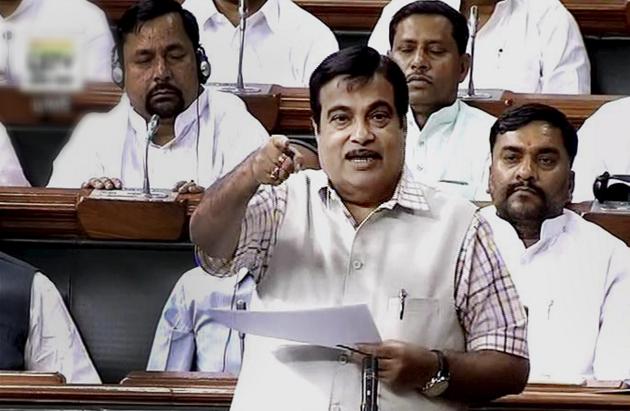Lok Sabha passes Motor Vehicle Act to bring reforms in transport sector
Lok Sabha today approved a bill for radical reforms in transport sector that will usher in multi-fold hike in fine for traffic violations, compensation of Rs 5 lakh for grave injuries, and check bogus licences and vehicle theft.
Lok Sabha today approved a bill for radical reforms in transport sector that will usher in multi-fold hike in fine for traffic violations, compensation of Rs 5 lakh for grave injuries, and check bogus licences and vehicle theft.

The bill, which seeks to amend nearly 30-year-old Motor Vehicle Act 1988, also calls for 100 per cent e-governance and will cap maximum liability for third party insurance at Rs 10 lakh in case of death in a motor accident.
All efforts would be made to eliminate corruption in the sector, Road Transport and Highways Minister Nitin Gadkari said while replying to a discussion on the Motor Vehicle (Amendment) Bill, 2016, claiming that “no bogus driving lincences would be made and there would be no theft of vehicles once there is e-governance.”
The bill was passed by a voice vote after several opposition amendments were rejected, including one moved by a CPI(M) member on enhancing the compensation in case of accidents, was defeated by 37 votes in favour and 221 against.
“The bill proposes a compensation of Rs 5 lakh. This is not the upper limit. After getting this amount (the affected family) can withdraw the case or appeal,” he said.
“This (Rs 5 lakh) is being done to ensure that there are less court cases and immediate compensation is given ...,” Gadkari said.
The minister also said that it would not be possible to increase the compensation in case of death to Rs 20 lakh as it would entail substantial hike in insurance premium.
Referring to the members’ concern over third party insurance, Gadkari said, “There is no upper ceiling in awarding compensation by Claims Tribunal.”
He also said that in accordance with the recommendations of standing committee the bill also has provision for payment of entire compensation by insurance companies.
In case of death in hit-and-run accidents, the bill provides for eight-fold increase in compensation to Rs 2 lakh.
Stressing that any kind of corruption would not be tolerated in the transport sector, he said, “We will have to bring online governance to put an end to the corruption. Corruption would not be tolerated and we are firm on this.”
There should be uniformity in the rules concerning issuance of driving licences, the minister said, adding that through “e-governance, there would be provision of electronic registration.”
The bill seeks to “save lives” by ushering in radical reforms in the motor vehicles law to slap heavy penalty on traffic violators, protecting good samaritans and making vehicle-makers responsible for design defects to cut road accidents.
The basic aim of the bill is “to save human lives”, as a whopping 5 lakh accidents take place every year claiming around 1.5 lakh lives across the country.
“Once we (BJP) complete five years, we would be able to save 50 per cent lives lost due to road accidents. We are working towards it,” Gadkari said.
The minister said once the changes are incorporated in the law, it would be impossible for anyone including VIPs like politicians to obtain driving licence without tests.
“Even as a minister I would not be able to obtain driving licence sitting at home,” Gadkari stressed.
Observing that there was corruption at state check posts and the Centre was in touch with states to deal with the issue.
The bill seeks to make services like issuance of licences totally transparent and online and provides for punitive action against officials in case of delay in issuance of the document to eligible applicants.
Under the new system, every one will have to go to the licence issuing authority under a uniform procedure and if the licence is not issued in three days, the RTO will have to face action. A learner’s licence can be availed online sitting at home.
Gadkari expressed concern over a large number of road accidents due to drunk driving and said that the government was thinking of strict action against such people.
Asserting that life was of paramount importance, he said the ministry was planning to come up with crash barriers on the roadside.
The government, he said, has already 786 black spots across the country, which are accident prone.
“There is a provision in the bill under which if holes are found on roads, DPR designer and contractor would be held accountable,” Gadkari said, adding that the ministry would blacklist the contractor.
The minister said that the proposal on strengthening the network of trauma centres has also been received.
Euro VI emission norms, Gadkari added, would be made mandatory from April 1, 2020.
The bill provides for linking of driving licence and vehicle registration with Adhaar-based platform and heavy penalties for traffic violations.
The bill also provides for Aadhaar-based verification for grant of online services including learner’s licence. This would ensure integration of online services and also stop creation of duplicate licences.
Stricter penalties have been proposed for high risk offences such as drunken driving, dangerous driving, overloading, non-adherence to safety norms by drivers (such as use of seat belt, helmets).
The bill aims to provide for a national database of vehicles and driving licences that would help in safety and security and avoid malpractices.
It also provides specific timelines for processing of insurance claims. A ten fold increase has been made in the amount of compensation awarded under a simplified process of claims disbursal wherein the family of an accident victim would get compensation of Rs 5 lakh as settlement within four months of the accident. Presently it takes at least four to five years for an award.
Stay informed on Business News, TCS Q4 Results Live along with Gold Rates Today, India News and other related updates on Hindustan Times Website and APPs



